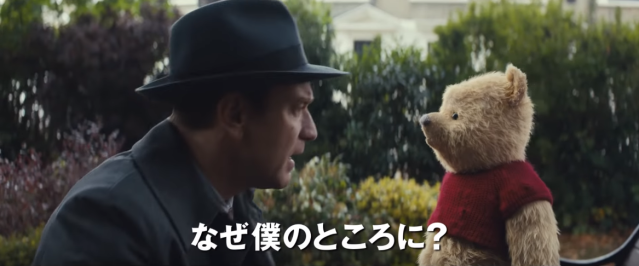
The life of the stressed-out main character in the live-action Winnie the Pooh film is one of leisure compared to many Japanese adults’.
Hollywood movies are extremely popular in Japan, and usually play in theaters with their original English dialogue and Japanese subtitles. However, sometimes they’re marketed differently in Japan than they are in the U.S., such as when Big Hero 6 was renamed Baymax and focused more on the hugs than the action, or when Wonder Woman was promoted with a pop song claiming “a woman can’t sleep alone.”
In general, Japanese moviegoers have a stronger craving for catharsis, but that actually makes marketing the Winnie the Pooh pseudo-sequel Christopher Robin, which opened here last week, pretty easy. It’s a story of the titular character trying to recapture his lost sense of boyhood wonder as he deals with the intense pressure of a dreary office job, making it a simple, straightforward sell to dissatisfied Japanese salarymen and office ladies.
▼ Trailer for Pooh and Me as an Adult (Pooh to Otona ni Natta Boku), as Christopher Robin is titled in Japan
But while Japanese adults can easily sympathize with Christopher Robin’s melancholy, many of them are actually ruefully jealous of the specifics of his work/life balance, as shown in this observation from Japanese Twitter user @katatakoyaki.
プーと大人になった僕を観てきました。衝撃的だったのが、社畜のハードワーカーと言われ、妻に「このままでは壊れてしまう」と心配される主人公ロビンの帰宅時間が21時だったことです。
— カタタコ (@katatakoyaki) September 15, 2018
“Just got back from seeing Christopher Robin. Everyone in the movie says the main character is a super hard-working wage slave and worries about him, with his wife saying ‘If you keep this up, it’ll break you,’ so I was shocked to see that he arrives home at 9 p.m.”
See, in Japan, if you finish work early enough that you don’t just clock out, but actually walk through the door of your home at 9 o’clock, you’re not going to get all that much sympathy from Japanese society at large. Sure, that’s a busy day, but lots of people in Japan who work in offices where the official quitting time is supposed to be 6 o’clock regularly do a couple hours of overtime. Add in an hour-long commute from the expensive city center out to the more affordable suburbs, and getting home at 9 is actually on the early side for a lot of Japanese businesspeople.
@katatakoyaki’s tweet elicited responses including:
“Getting home at 9 p.m.? Pretty normal.”
“Wait, doesn’t everybody work until 9 at night?”
“If Christopher Robin’s wife is worried about him, what about me? I work until 1:30 in the morning, get home and go to sleep at 2:30, and then get up at 4:30.”
“Japan’s workforce is already broken.”
“Having an emotional breakdown just because you didn’t get home until 9? That’s a lot softer than people in Japan who work until after midnight…it’s kind of weird that Japan is like that, though.”
“Watching the movie was a culture shock for me,” continued @katatakoyaki. So how much work does a fictional character have to do in order to be seen as obviously working extra-hard in Japan?
▼ “Ahhh! There’s nothing like a beer after working 20 hours straight!”
一方、日本の社蓄は。 pic.twitter.com/DZLNiNdIL9
— カタタコ (@katatakoyaki) September 16, 2018
Granted, many of the commenters who pointed out that they weren’t shocked by Christopher Robin’s work schedule were also quick to point out that that’s more the result of Japanese companies’ unreasonable expectations than any sort of mental weakness on the part of the movie’s protagonists. Still, in a country where the lights of office high-rises stay on past midnight, there are probably a lot of people who’d like to trade places with him.
Source: Twitter/@katatakoyaki via Jin
Top image: YouTube/ディズニー公式

 Is overtime work in Tokyo going to get worse thanks to the Olympics’ new last train schedules?
Is overtime work in Tokyo going to get worse thanks to the Olympics’ new last train schedules? Tokyo companies’ late-night overtime habits exposed in time-lapse YouTube video channel【Videos】
Tokyo companies’ late-night overtime habits exposed in time-lapse YouTube video channel【Videos】 Bloomberg’s video makes Japanese business etiquette seem way more complicated than it really is
Bloomberg’s video makes Japanese business etiquette seem way more complicated than it really is Japanese restaurant chain serves Dragon Ball donuts and Senzu Beans this spring
Japanese restaurant chain serves Dragon Ball donuts and Senzu Beans this spring Japan’s craziest burger chain takes menchi katsu to new extreme levels
Japan’s craziest burger chain takes menchi katsu to new extreme levels Starbucks Japan releases first-ever Hinamatsuri Girls’ Day Frappuccino
Starbucks Japan releases first-ever Hinamatsuri Girls’ Day Frappuccino Highest Starbucks in Japan set to open this spring in the Tokyo sky
Highest Starbucks in Japan set to open this spring in the Tokyo sky Japanese high school students hatch chick without an eggshell during class【Video】
Japanese high school students hatch chick without an eggshell during class【Video】 Hello Kitty isn’t a cat!? We called Sanrio to find out!
Hello Kitty isn’t a cat!? We called Sanrio to find out! Drift ice in Japan is a disappearing winter miracle you need to see now
Drift ice in Japan is a disappearing winter miracle you need to see now Anime sword fighting isn’t like reality. Why? Biomechanics (again)
Anime sword fighting isn’t like reality. Why? Biomechanics (again) Japanese gravure idol strips down, plays drums to anime hits【Videos】
Japanese gravure idol strips down, plays drums to anime hits【Videos】 Anime isn’t like reality: Terrifying dentistry edition
Anime isn’t like reality: Terrifying dentistry edition Tokyo Skytree turns pink for the cherry blossom season
Tokyo Skytree turns pink for the cherry blossom season Yakuzen ramen restaurant in Tokyo is very different to a yakuza ramen restaurant
Yakuzen ramen restaurant in Tokyo is very different to a yakuza ramen restaurant Japan Extreme Budget Travel! A trip from Tokyo to Izumo for just 30,000 yen [Part 1]
Japan Extreme Budget Travel! A trip from Tokyo to Izumo for just 30,000 yen [Part 1] Japan has only one airport named after a samurai, so let’s check out Kochi Ryoma【Photos】
Japan has only one airport named after a samurai, so let’s check out Kochi Ryoma【Photos】 Japanese drugstore sells onigiri at pre-stupid era prices, but how do they compare to 7-Eleven?
Japanese drugstore sells onigiri at pre-stupid era prices, but how do they compare to 7-Eleven? Burning through cash just to throw things away tops list of headaches when moving house in Japan
Burning through cash just to throw things away tops list of headaches when moving house in Japan Starbucks Japan releases new sakura goods and drinkware for cherry blossom season 2026
Starbucks Japan releases new sakura goods and drinkware for cherry blossom season 2026 Japan’s newest Shinkansen has no seats…or passengers [Video]
Japan’s newest Shinkansen has no seats…or passengers [Video] Foreigners accounting for over 80 percent of off-course skiers needing rescue in Japan’s Hokkaido
Foreigners accounting for over 80 percent of off-course skiers needing rescue in Japan’s Hokkaido Super-salty pizza sends six kids to the hospital in Japan, linguistics blamed
Super-salty pizza sends six kids to the hospital in Japan, linguistics blamed Starbucks Japan unveils new sakura Frappuccino for cherry blossom season 2026
Starbucks Japan unveils new sakura Frappuccino for cherry blossom season 2026 Foreign tourists in Japan will get free Shinkansen tickets to promote regional tourism
Foreign tourists in Japan will get free Shinkansen tickets to promote regional tourism The 10 most annoying things foreign tourists do on Japanese trains, according to locals
The 10 most annoying things foreign tourists do on Japanese trains, according to locals Take a trip to Japan’s Dododo Land, the most irritating place on Earth
Take a trip to Japan’s Dododo Land, the most irritating place on Earth Naruto and Converse team up for new line of shinobi sneakers[Photos]
Naruto and Converse team up for new line of shinobi sneakers[Photos] Is China’s don’t-go-to-Japan warning affecting the lines at a popular Tokyo gyukatsu restaurant?
Is China’s don’t-go-to-Japan warning affecting the lines at a popular Tokyo gyukatsu restaurant? Survey asks foreign tourists what bothered them in Japan, more than half gave same answer
Survey asks foreign tourists what bothered them in Japan, more than half gave same answer Japan’s human washing machines will go on sale to general public, demos to be held in Tokyo
Japan’s human washing machines will go on sale to general public, demos to be held in Tokyo Starbucks Japan releases new drinkware and goods for Valentine’s Day
Starbucks Japan releases new drinkware and goods for Valentine’s Day We deeply regret going into this tunnel on our walk in the mountains of Japan
We deeply regret going into this tunnel on our walk in the mountains of Japan Studio Ghibli releases Kodama forest spirits from Princess Mononoke to light up your home
Studio Ghibli releases Kodama forest spirits from Princess Mononoke to light up your home Major Japanese hotel chain says reservations via overseas booking sites may not be valid
Major Japanese hotel chain says reservations via overseas booking sites may not be valid Put sesame oil in your coffee? Japanese maker says it’s the best way to start your day【Taste test】
Put sesame oil in your coffee? Japanese maker says it’s the best way to start your day【Taste test】 No more using real katana for tourism activities, Japan’s National Police Agency says
No more using real katana for tourism activities, Japan’s National Police Agency says